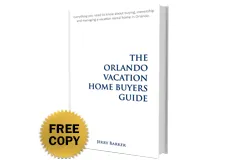Understanding Homeowners Insurance for Florida Vacation Homes
Understanding Coverage For Residential & Vacation Homes
Top Tips to consider when getting home insurance in Florida
When you own a villa or condominium in Florida, you will need home insurance to protect yourself, your renters, and your property. Florida encounters hurricanes, flooding and at times, litigious renters so being correctly insured will bring you peace of mind as well as protection.
Jerry Barker shares some tips to consider when shopping for a policy.
- Work with an expert insurance brokerage
Find an expert insurance broker who is local to the area you are buying in and understands the coverage you need. The right broker will help you get the best policy and can answer any questions you have. Your insurance broker can shop around each of the companies that write second home and short-term rental policies, and then present to you the top options that fit your needs.
- Take advantage of insurance discounts
Insurance companies may offer discounts for specific items such as roof construction and condition.
While getting a home inspection conducted, also consider ordering a wind mitigation report. Many insurance companies offer a discount to properties with a favorable wind mitigation profile.
- Add an Umbrella Policy
To protect you from any potential guest liability, ask your broker to add an umbrella policy with liability coverage up to $1 million to protect you from any guest mishaps in the home, pool or garden.
- Bind your policy expediently.
If financing, you cannot close on your home without a policy. If a named storm is in the Florida vicinity, insurance companies will not bind a policy until the storm passes. Secure an insurance policy early so closing will not be delayed. It won’t cost you any more.
- Confirm your Hurricane Deductible
The hurricane deductible is the amount you pay before receiving money from the insurance company when making a claim due to hurricane damage. The lower the deductible, the higher the premium so discuss the hurricane deductible with your broker before selecting your policy.
- Check the age of the roof
If the roof is older than 15 years your insurance broker may have less policy options to offer you and premiums may be higher. If the roof is close to “end of life”, insurance may be declined unless the roof is replaced. This is an item that you need to be aware of while negotiating a contract.
- Flood Insurance
The elevation of your home will determine if you are in a flood zone. Flood zones X, B, and C are considered “moderate to low risk”, which means flood insurance may not be required. Your broker will be able to advise if you need to add flood insurance to your policy.
- Understanding “Force Majeure”
“Force Majeure” pertains to hurricanes, floods, extreme weather, earthquakes, fire, or other “acts of God”. In the event of a “Force Majeure” event, all contractual time periods for Buyers and Sellers are automatically extended for a period of 7 days. This means deposit, inspection, loan approval, closing dates etc. may be extended if required. This will allow the process to reset with new milestone dates for the transaction if they are required by the buyer or the seller.
Insurance Questions Answered | Doug Fudge

Bonding Insurance Early!

CUSTOM PROPERTY SEARCH
Find the Perfect Vacation Home
READ BUYER REVIEWS
Hear From Experienced Buyers
VACATION HOME BUYERS GUIDE
Get a Copy for FREE
CONTACT JERRY BARKER
Complimentary Consultation


